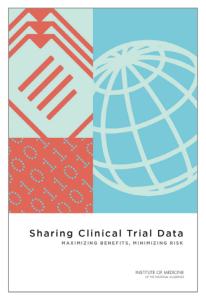After two years of deliberation, the Institute of Medicine, part of the National Academies of Science, has concluded that sharing data from clinical trials is clearly in the public interest. In a detailed report released on January 14, the IOM said the issue was not whether to share, but how to do so responsibly. In this respect, the IOM committee members provided more in the way of ruminative guidelines than concrete recommendations that could be swiftly implemented — an omission disappointing to some members of the AllTrials campaign. Nonetheless, the report has been welcomed as a signal moment in the history of science: “At this point they are codifying what is an emerging consensus and unstoppable growing momentum for open science in medical research,” said Harlan Krumholz, principal investigator for the Yale Open Data Access (YODA) Project.
“This is an encouraging message,” said Lauren Quattrochi, Director of Sense About Science USA’s AllTrials campaign. “Responsible sharing is not only the way to build trust between physicians, pharmaceutical researchers and patients, it’s the basis for tackling the immense challenge of synthesizing novel medicinal compounds.”

“In short, the current system fails to provide an adequate return on the investments of trial participants, investigators, and sponsors. Greater data sharing could enhance public well-being by accelerating the drug discovery and development process, reducing redundant research, and facilitating scientific innovation”— IOM, Sharing Clinical Trial Data
“No one now has any excuse not to commit to sharing clinical trial data,” said Tracey Brown, Managing Director of Sense About Science in the UK, which cofounded the AllTrials campaign. The report confirmed what the campaign had demonstrated since its launch: sharing is possible. “The only people who are still saying that challenges to data sharing make it impossible,” said Brown, “are the ones who are not sharing results.”
“There is no way back,” said Dr. Ben Goldacre, author of Bad Pharma and co-founder of the AllTrials campaign. “Data sharing is vital if we are to make truly informed decisions with patients about which treatment is best for them. It helps us spot when trials have been misleadingly or incorrectly analyzed. It helps prevent trials being repeated unnecessarily. It allows us to combine all the information, from large numbers of studies, and so produce the clearest possible picture of which treatments work best overall. It also helps us identify which treatment will work best for each individual patient.”
“We were ready for a tipping point event,” Deborah Zarin, director of ClinicalTrials.gov told Vox. “This is a statement that the expectations have changed: if you’re a researcher or a research sponsor, there’s going to be an expectation that you’re going to make data available at the end of your study.”
The AllTrials campaign in the US will be working to ensure that the IOM report is indeed just such a tipping point.We are excited,” said Quattrochi, “about what the future holds for both legacy and new medicines.”

Recent Comments